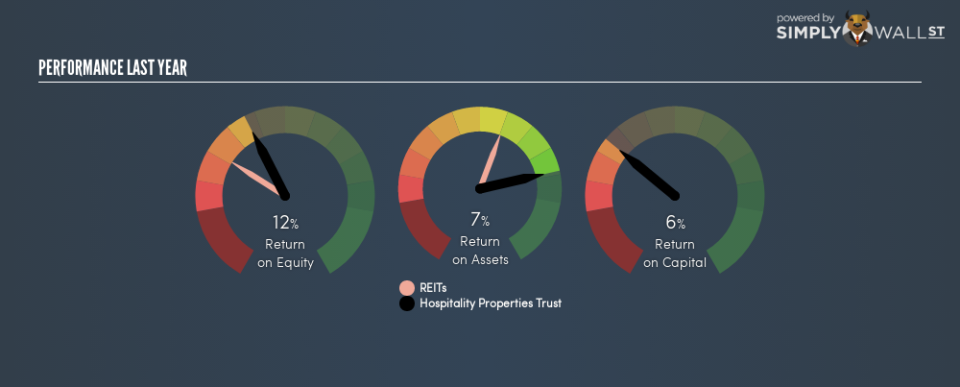Should You Be Impressed By Hospitality Properties Trust’s (NASDAQ:HPT) ROE?

Want to participate in a short research study? Help shape the future of investing tools and you could win a $250 gift card!
One of the best investments we can make is in our own knowledge and skill set. With that in mind, this article will work through how we can use Return On Equity (ROE) to better understand a business. We’ll use ROE to examine Hospitality Properties Trust (NASDAQ:HPT), by way of a worked example.
Our data shows Hospitality Properties Trust has a return on equity of 12% for the last year. That means that for every $1 worth of shareholders’ equity, it generated $0.12 in profit.
Check out our latest analysis for Hospitality Properties Trust
How Do You Calculate ROE?
The formula for return on equity is:
Return on Equity = Net Profit ÷ Shareholders’ Equity
Or for Hospitality Properties Trust:
12% = 326.139 ÷ US$2.8b (Based on the trailing twelve months to September 2018.)
Most know that net profit is the total earnings after all expenses, but the concept of shareholders’ equity is a little more complicated. It is all earnings retained by the company, plus any capital paid in by shareholders. You can calculate shareholders’ equity by subtracting the company’s total liabilities from its total assets.
What Does ROE Signify?
ROE looks at the amount a company earns relative to the money it has kept within the business. The ‘return’ is the profit over the last twelve months. That means that the higher the ROE, the more profitable the company is. So, as a general rule, a high ROE is a good thing. Clearly, then, one can use ROE to compare different companies.
Does Hospitality Properties Trust Have A Good Return On Equity?
One simple way to determine if a company has a good return on equity is to compare it to the average for its industry. However, this method is only useful as a rough check, because companies do differ quite a bit within the same industry classification. Pleasingly, Hospitality Properties Trust has a superior ROE than the average (6.9%) company in the REITs industry.
That’s what I like to see. I usually take a closer look when a company has a better ROE than industry peers. One data point to check is if insiders have bought shares recently.
The Importance Of Debt To Return On Equity
Virtually all companies need money to invest in the business, to grow profits. That cash can come from issuing shares, retained earnings, or debt. In the first two cases, the ROE will capture this use of capital to grow. In the latter case, the debt required for growth will boost returns, but will not impact the shareholders’ equity. That will make the ROE look better than if no debt was used.
Hospitality Properties Trust’s Debt And Its 12% ROE
Hospitality Properties Trust clearly uses a significant amount debt to boost returns, as it has a debt to equity ratio of 1.48. while its ROE is respectable, it is worth keeping in mind that there is usually a limit to how much debt a company can use. Investors should think carefully about how a company might perform if it was unable to borrow so easily, because credit markets do change over time.
But It’s Just One Metric
Return on equity is a useful indicator of the ability of a business to generate profits and return them to shareholders. Companies that can achieve high returns on equity without too much debt are generally of good quality. All else being equal, a higher ROE is better.
But when a business is high quality, the market often bids it up to a price that reflects this. Profit growth rates, versus the expectations reflected in the price of the stock, are a particularly important to consider. So you might want to check this FREE visualization of analyst forecasts for the company.
But note: Hospitality Properties Trust may not be the best stock to buy. So take a peek at this free list of interesting companies with high ROE and low debt.
To help readers see past the short term volatility of the financial market, we aim to bring you a long-term focused research analysis purely driven by fundamental data. Note that our analysis does not factor in the latest price-sensitive company announcements.
The author is an independent contributor and at the time of publication had no position in the stocks mentioned. For errors that warrant correction please contact the editor at editorial-team@simplywallst.com.

 Yahoo Finance
Yahoo Finance 
